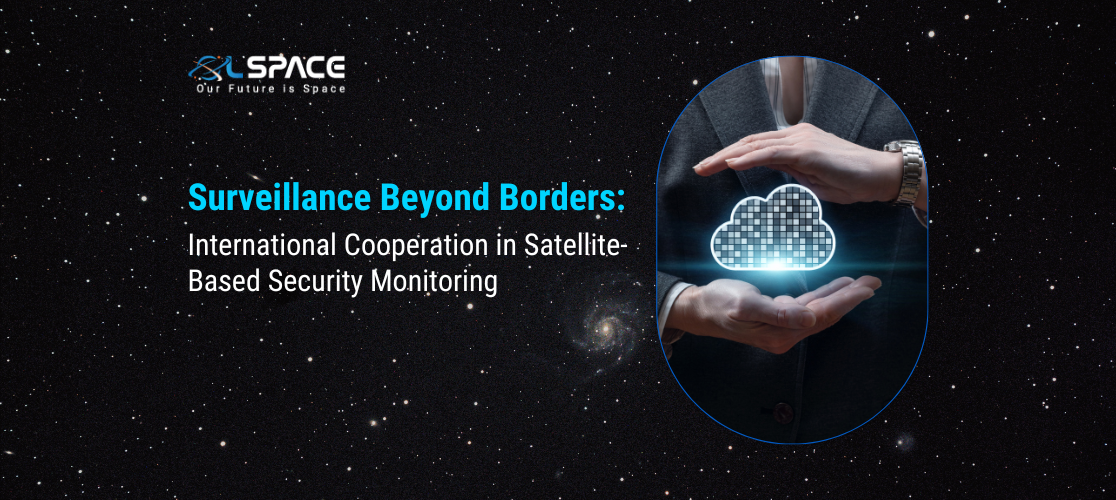09 February 2024
Surveillance Beyond Borders: International Cooperation in Satellite-Based Security Monitoring

In an interconnected world facing diverse security challenges, satellite-based surveillance has emerged as a critical tool for monitoring activities beyond national borders. International cooperation in satellite-based security monitoring enhances situational awareness, facilitates early warning systems, and fosters collaborative responses to global security threats. This article explores the importance of cross-border collaboration in leveraging satellite technology for security monitoring.
Global Threat Landscape:
Transnational Challenges: Security threats such as terrorism, organised crime, illicit trafficking, and environmental disasters transcend national boundaries. Satellite-based surveillance provides a comprehensive view of these threats, enabling proactive measures to address them effectively.
Enhanced Situational Awareness:
Real-Time Monitoring: Satellite imagery offers real-time monitoring capabilities, allowing authorities to track activities in remote or inaccessible areas. International cooperation in sharing satellite data enhances situational awareness and facilitates timely responses to emerging threats.
Border Security and Maritime Surveillance:
Border Monitoring: Satellite-based surveillance aids in monitoring borders and detecting unauthorised border crossings, smuggling, and illegal immigration. Collaborative efforts among neighboring countries bolster border security and mitigate cross-border security threats.
Environmental Monitoring and Disaster Response:
Natural Disaster Management: Satellite imagery assists in monitoring natural disasters such as earthquakes, floods, and wildfires, enabling timely response and disaster management efforts. International cooperation in satellite-based environmental monitoring enhances preparedness and resilience to natural disasters.
Maritime Domain Awareness:
Illegal Fishing and Piracy: Satellite-based monitoring systems contribute to maritime domain awareness by detecting illegal fishing activities, piracy, and maritime security threats. Collaborative initiatives among coastal states strengthen maritime security and protect marine resources.
Counterterrorism and Intelligence Sharing:
Terrorism Prevention: Satellite surveillance supports counterterrorism efforts by identifying terrorist training camps, clandestine facilities, and movement of extremist groups across borders. Intelligence sharing among allied nations enhances the effectiveness of counterterrorism operations.
Humanitarian Assistance and Crisis Response:
Humanitarian Relief Operations: Satellite imagery aids in assessing humanitarian crises and coordinating relief efforts in conflict zones or areas affected by natural disasters. International collaboration ensures swift and coordinated humanitarian assistance to affected populations.
Space Policy and Diplomacy:
Bilateral and Multilateral Agreements: Space policy frameworks and diplomatic agreements facilitate the sharing of satellite data and technologies among nations. Bilateral and multilateral partnerships promote trust, transparency, and cooperation in space-based security monitoring initiatives.
Capacity Building and Technology Transfer:
Skill Development: International cooperation supports capacity building initiatives to enhance the technical skills and capabilities of partner countries in satellite-based surveillance. Technology transfer programs facilitate access to satellite data and promote sustainable development.
Ethical and Legal Considerations:
Data Privacy and Sovereignty: Collaborative efforts in satellite-based security monitoring must adhere to ethical standards and respect data privacy and sovereignty concerns. Clear legal frameworks and agreements govern the sharing and use of satellite data among participating nations.
Conclusion
Satellite-based surveillance transcends national borders and requires collaborative efforts to address global security challenges effectively. By fostering international cooperation in satellite-based security monitoring, countries can enhance situational awareness, strengthen border security, and respond swiftly to emerging threats. Continued investment in collaborative initiatives, technology transfer, and capacity building is essential to harness the full potential of satellite technology for promoting peace, security, and stability in the international arena.
